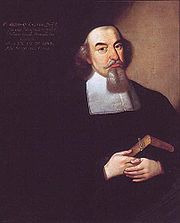
Abraham Calovius
Encyclopedia

Lutheran Orthodoxy
Lutheran orthodoxy was an era in the history of Lutheranism, which began in 1580 from the writing of the Book of Concord and ended at the Age of Enlightenment. Lutheran orthodoxy was paralleled by similar eras in Calvinism and tridentine Roman Catholicism after the...
in the 17th century.
Biography
He was born in Mohrungen (now MorągMorag
Morag may refer to:* Morag , a lake monster reported to inhabit Loch Morar in Scotland* Morąg , a city in Warmia-Masuria, Poland...
, Ostróda County
Ostróda County
Ostróda County is a unit of territorial administration and local government in Warmian-Masurian Voivodeship, northern Poland. It came into being on January 1, 1999, as a result of the Polish local government reforms passed in 1998. Its administrative seat and largest town is Ostróda, which lies ...
) in the Duchy of Prussia. After studying at Königsberg
Königsberg
Königsberg was the capital of East Prussia from the Late Middle Ages until 1945 as well as the northernmost and easternmost German city with 286,666 inhabitants . Due to the multicultural society in and around the city, there are several local names for it...
, in 1650 he was appointed professor of theology at Wittenberg, where he afterwards became general superintendent
Superintendent (ecclesiastical)
Superintendent is the head of an administrative division of a Protestant church, largely historical but still in use in Germany.- Superintendents in Sweden :...
and primarius.
Calovius opposed the Catholics, Calvinists and Socinians, and in particular attacked the syncretism
Syncretism
Syncretism is the combining of different beliefs, often while melding practices of various schools of thought. The term means "combining", but see below for the origin of the word...
of his bitter enemy, George Calixtus. While Calixtus affirmed that the Apostles' Creed
Apostles' Creed
The Apostles' Creed , sometimes titled Symbol of the Apostles, is an early statement of Christian belief, a creed or "symbol"...
was an adequate definition of faith, Calovius rather held that one must believe every part of revealed truth in order to gain salvation. This led Calovius to deny as a heresy
Heresy
Heresy is a controversial or novel change to a system of beliefs, especially a religion, that conflicts with established dogma. It is distinct from apostasy, which is the formal denunciation of one's religion, principles or cause, and blasphemy, which is irreverence toward religion...
the idea that Roman Catholics or Calvinists could be partakers of salvation.
As a writer of polemics Calovius had few equals. His chief dogmatic work, Systema Iocorum theologicorum, (12 volumes, 1655–1677) represents the climax of Lutheran scholasticism
Lutheran scholasticism
Lutheran scholasticism was a theological method that gradually developed during the era of Lutheran Orthodoxy. Theologians used the neo-Aristotelian form of presentation, already popular in academia, in their writings and lectures...
. He produced a popular commentary on Martin Luther
Martin Luther
Martin Luther was a German priest, professor of theology and iconic figure of the Protestant Reformation. He strongly disputed the claim that freedom from God's punishment for sin could be purchased with money. He confronted indulgence salesman Johann Tetzel with his Ninety-Five Theses in 1517...
's translation of the Bible, "die deutsche Bibel," today known as the Calov Bible
Calov Bible
The Calov Bible is a three-volume 17th-century Bible that contains German translations and commentary by Martin Luther and additional commentary by Wittenberg theology professor Abraham Calovius.-Connection with J. S. Bach:...
. He also wrote a much larger professional exegetical work on the entire Bible called "Biblia Illustrata." It is written from the point of view of a very strict belief in inspiration, his object being to refute the statements made by Hugo Grotius
Hugo Grotius
Hugo Grotius , also known as Huig de Groot, Hugo Grocio or Hugo de Groot, was a jurist in the Dutch Republic. With Francisco de Vitoria and Alberico Gentili he laid the foundations for international law, based on natural law...
in his Commentaries.

